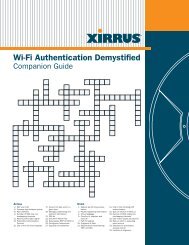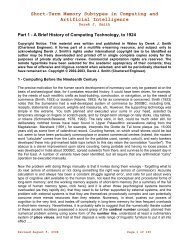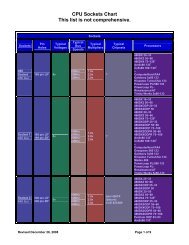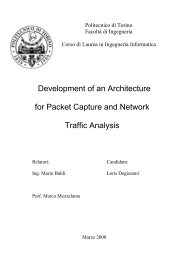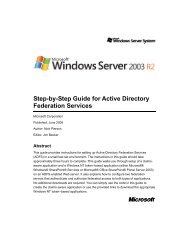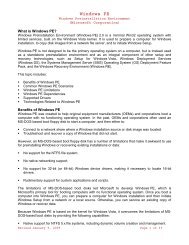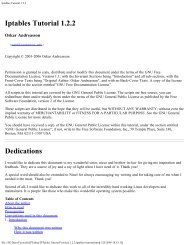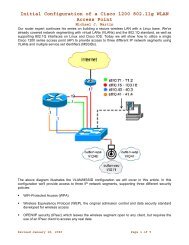SCO UnixWare 2.1 Technical Summary - Bandwidthco Computer ...
SCO UnixWare 2.1 Technical Summary - Bandwidthco Computer ...
SCO UnixWare 2.1 Technical Summary - Bandwidthco Computer ...
You also want an ePaper? Increase the reach of your titles
YUMPU automatically turns print PDFs into web optimized ePapers that Google loves.
An <strong>SCO</strong> <strong>Technical</strong> White Paper Version <strong>2.1</strong>.2<br />
44<br />
• DDI conformance tool, a utility that can be used to ensure that the driver complies with<br />
DDI/DKI interface standards.<br />
• packaging utilities and source code for creating driver installation floppy disks.<br />
Device driver developers can also use the auto-configuration mechanism provided with the<br />
<strong>SCO</strong> <strong>UnixWare</strong> kernel. This allows device drivers to take advantage of the automatic detection<br />
and configuration capabilities available in some HBAs and devices. Auto-detection enables the<br />
device driver to see whether the device it is to control actually exists on the system.<br />
Platform Support Kit (PSK)<br />
The <strong>SCO</strong> <strong>UnixWare</strong> Platform Support Kit (PSK) provides a quick, easy and cost-effective way<br />
for OEMs whose products are based on the Intel 80*86 architecture family to ensure that <strong>SCO</strong><br />
<strong>UnixWare</strong> supports their uni-processor and multiprocessor hardware platforms. PSK provides :<br />
• sample source code<br />
• documentation<br />
• compatibility tests<br />
• certification process for Platform Support Modules (PSMs)<br />
Platform Support Modules (PSMs) are the layer of software that sits between the <strong>SCO</strong><br />
<strong>UnixWare</strong> <strong>2.1</strong> kernel and the hardware. The PSM mechanism allows for greater system<br />
portability onto new architectures.<br />
Software Packaging Tools<br />
Software Packaging Tools provide the tools to create and modify installable UNIX software<br />
packages. UNIX package support (also known as pkgadd format) is a standard mechanism for<br />
installing applications, drivers and files onto the <strong>SCO</strong> <strong>UnixWare</strong> system. A complete set of tools<br />
are provided to install, remove, display information about, and check the contents of a package.<br />
The popular custom mechanism is also supported on <strong>SCO</strong> <strong>UnixWare</strong> <strong>2.1</strong>.<br />
<strong>SCO</strong> <strong>UnixWare</strong> <strong>2.1</strong> Standards Conformance<br />
<strong>SCO</strong> <strong>UnixWare</strong> is a standards-based operating system that drives and complies with many of<br />
the important Open Systems standards and specifications that have been adopted in the<br />
computer industry to date. These include standards in the area of operating system interfaces,<br />
commands and utilities, languages, and networking areas such as TCP/IP, IPX/SPX, SNMP, etc.<br />
The standards to which <strong>SCO</strong> <strong>UnixWare</strong> conforms can be classed as binary and source. Source<br />
standards enhance compatibility of source code across all implementations of the UNIX system,<br />
whereas binary standards enhance compatibility of binary code across processor family<br />
implementations.<br />
Standards-based Application Programming Interfaces (APIs)<br />
<strong>SCO</strong> <strong>UnixWare</strong> system’s powerful applications runtime environment conforms to industry<br />
standards in order to support most off-the-shelf applications. Key standards are:<br />
• POSIX - Portable Operating System for UNIX (POSIX.1, POSIX.2 and POSIX.4)<br />
• Single UNIX Specification (SPEC 1170 aka UNIX95)<br />
• FIPS 151-2 - Federal Information Processing Standard<br />
• SVID3 - System V Interface Definition, Issue 3<br />
• XPG4 - X/Open Portability Guide<br />
• iABI - Intel Application Binary Interface<br />
• iABI+ - Intel Application Binary Interface +



